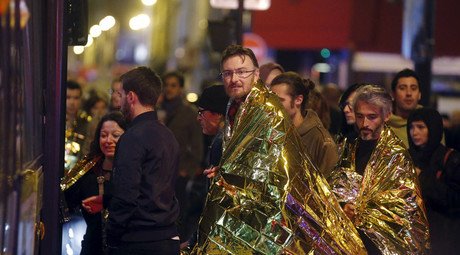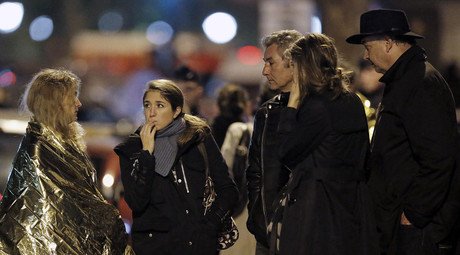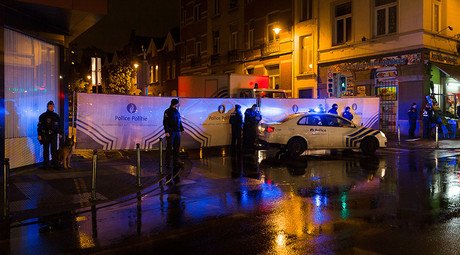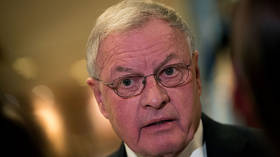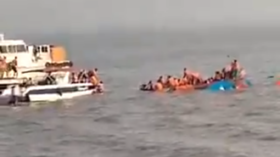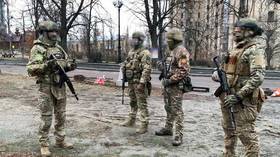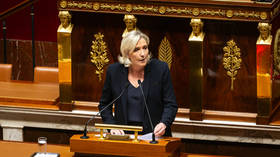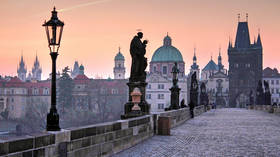‘Sorrow in the air’: Terror spree has changed Paris forever, witnesses tell RT
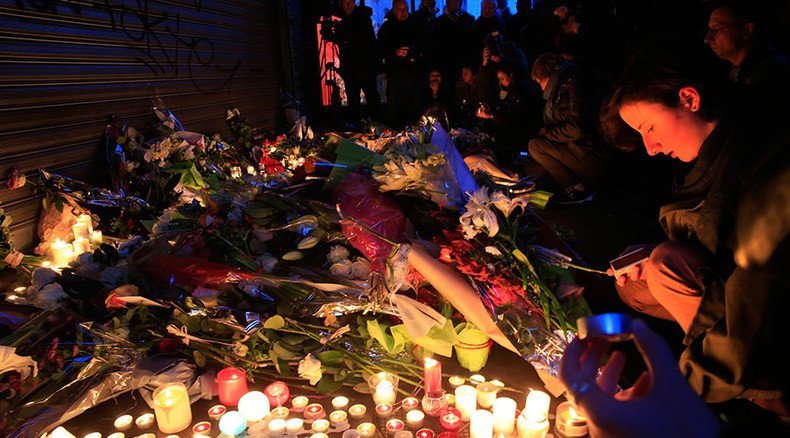
A series of coordinated terrorist attacks that devastated Paris have forever changed the city into “before and after” Friday 13. RT caught up with some people who witnessed the horrors, to find out what life is like in a city gripped by fear, but also resolve.
LIVE UPDATES: Paris massacre: World mourns 120+ killed in series of terrorist attacks
As the French President Francois Hollande was being escorted from the France-Germany football friendly match, following explosions near the Stade de France stadium at around 9:25 pm (8:25 pm GMT) on Friday night, a gunman armed with a semi-automatic weapon opened fire at the crowded Le Carillon bar in the center of the French capital.
Guillermo Perez, who was enjoying an evening out at one of the venues along the Canal St. Martin “just a few meters away” from the spot where the shooting took place, shared his recollections with RT.
“In the first few minutes, there was a massive amount of confusion in the bar because we were beginning to receive news, especially on our cell phones, that a shooting had taken place near where we were,” Perez told RT.
The banks of the Canal St. Martin in the 10th district of Paris, is a neighborhood filled with bars, restaurants, and cafes.
Perez recalled that people in the establishment had no idea if the assailants had fled the scene, how many of them were there, or what should they do in this situation. “The security, [at the bar] told us that it was unsafe to go outside.”
“The security guards, also stopped allowing people to come into the bar due to safety concerns,” Perez said. “We had to stay inside the venue until we were told that is was safe to go outside and go home.”
Following the attack on Le Carillon, the gunman then crossed the street and unleashed a further deadly assault at the Le Petit Cambodge, a Cambodian and Vietnamese restaurant. At least 15 people lost their lives.
Meanwhile over in the 6th district, news started filtering in of the ongoing attacks, which indicated that the attackers were moving closer to the place where Ekaterina Pushkina was having dinner with her friends.
“There was just this crazy panic,” she told RT. “People were being told to lie on the floor, which created even more panic as some people were trying to go home.”
By around 9:30 pm (8:30 pm GMT), five people were dead on Rue de la Fontaine au Roi in the 11th district, a trendy Parisian area. At least another eight were wounded.
“The scariest thing is when you sit in a closed restaurant and you understand that while you are sitting there, people are dying,” Pushkina recalled.
Aleksey Moskalenko, was also having a dinner with a friend, in another part of the capital. When the news of the shootings started trickling in, he told RT, he looked at his phone and his worst fears had come true.
“This was happening right next to the entrance of the building where I live,” Moskalenko said.
Fear, panic and shock gripped all the people RT interviewed, as they all tried to get to safety and escape the crowded areas where they were trapped. It was at this point the Paris authorities took the decision to block roads, as thousands of policemen and the army were being deployed across the whole city.
“All the streets were closed off, all the metro lines were shut down. The police were everywhere. You could say we were cut off from civilization,” Pushkina said. “We could not get a taxi, or we could not contact anyone by phone as the networks were most likely down, due to the high volume of calls being made.”
“The metro was closed. There were no taxis,” Moskalenko said, telling RT that he managed to get to his friend’s house to stay the night. “I knew there was no way I would be able to get to the neighborhood where I lived.”
Moskalenko added there was a really “creepy atmosphere” in the air, when he finally managed to reach his home the following day.
“My fears were confirmed. The closer I came to my house, the bigger the crowd got. Everyone was silent. No one spoke with anyone. People were crying. They were all locals. Everyone comes from nearby streets. It was a local cafe where everyone knew each other,” Moskalenko recalled.
A day after the atrocities, people are trying to stay indoors. A native of St. Petersburg, a city which has also grieved recently following the loss of 224 lives in a plane crash in Egypt, Pushkina, says that Paris has turned into a “ghost town.” However, everyone seems united against the terror and is determined not to let the terrorists win.
Moskalenko, claims it is difficult to look people in the eye on the street where he resides, as many locals lost people close to them in the attacks.
“When this happens right across from where you live, you have to understand how scary it is. You always go down onto the street to get some wine, or cheese, or visit the little boutiques where you shop. It is scary because these are all faces that you know. Even if do not know them personally, you still say ‘hi’ to them,” Moskalenko explained.
“There is a feeling of sorrow in the air,” Perez said; as the streets are almost empty. “We are all really sad. Paris is on a knife-edge. It is not easy to live through a tragedy like this.”
“The people are panicking. No one is going outside...The streets are deserted,” Pushkina confirmed, adding that many people are trying to leave the French capital and there are soldiers on the streets.
“People are panicking because they shot at the working class. The shooters did not go to prestigious neighborhoods. They shot at the young crowd.”
At the same time, Parisians are being courteous to each other, observing the famous French etiquette with dead silence and mutual understanding.
“There is an atmosphere of understanding. There is a deathly silence. It is very quiet,” Moskalenko told RT. If discussions are taking place on the street, he added, most people talk about how they knew, or indirectly knew some of the victims.
“The French have a virtue of being able to unite because the thing that is most sacred in France is freedom. If you take away freedom in France, you take away everything, especially the freedom to live.”
Perez says that the incident has changed Paris into the city of “before and after” the Friday 13th attacks.
“We hear threats directed towards our country. There is a degree of fear, that this aggression could be repeated,” Perez said. “But even now, people are trying to get back to life as usual, go to supermarket, go to the cinema, or just go for a walk.”
